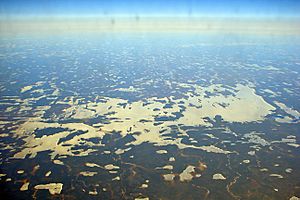Wunnumin Lake First Nation facts for kids
The Wunnumin Lake First Nation is a community of Oji-Cree people, who are part of Canada's First Nations. They live near Wunnummin Lake in northwestern Ontario, Canada. This area is about 360 kilometers (224 miles) northeast of Sioux Lookout.
The name "Wunnumin Lake" comes from the Oji-Cree language, where it is called Wanaman-zaaga'iganiing. This means "At Wunnumin Lake." The First Nation has two main areas of land, called reserves: Wunnumin 1 and Wunnumin 2. In 2007, about 565 people were officially registered as members of the Wunnumin Lake First Nation.
Contents
How to Get There
Travel by Air
Most people travel to Wunnumin Lake First Nation by flying to the Wunnumin Lake Airport. This is the main way to reach the community for much of the year.
Winter Roads
During the cold winter months, people can also travel to Wunnumin Lake using special roads made of ice and snow. These are known as "winter roads" or "The White Highway." They connect the community to other places when the ground is frozen solid.
Community Safety
Policing Services
The Wunnumin Lake community is kept safe by the Nishnawbe-Aski Police Service. This police service is specially set up to serve Aboriginal communities in the area.
History of Wunnumin Lake
The Meaning of the Name
The name Wunnumin Lake, or Wanaman-zaaga'igan in Oji-Cree, means "Vermillion Lake." This name comes from the reddish-orange clay found around the lake.
An Ancient Story
There is an old legend about how the lake got its name. The story tells of Wiisagejaak, a powerful Crane spirit. He was hunting for food and found a "Big Beaver" and its baby living on the Pipestone River. Wiisagejaak chased them to this area. When he caught the baby beaver, it bled, and its blood soaked into the ground, staining the clay the vermillion color we see today.
Moving to Wunnumin Lake
The people who live at Wunnumin Lake today originally came from a place called Big Beaver House, Ontario. After a very large forest fire, the community at Big Beaver House had to move. Some people moved to Wunnumin Lake, while others went to a different location.
Signing Treaty 9
Between 1929 and 1930, the leaders of Wunnumin Lake First Nation traveled to Big Trout Lake. There, they took part in signing an agreement called Treaty 9. This treaty is an important agreement between First Nations and the Canadian government.
Official Reserve Status
The Wunnumin Lake First Nation officially received its reserve status on March 2, 1976. This meant their land was formally recognized as a reserve for their community.
 | Mary Eliza Mahoney |
 | Susie King Taylor |
 | Ida Gray |
 | Eliza Ann Grier |


